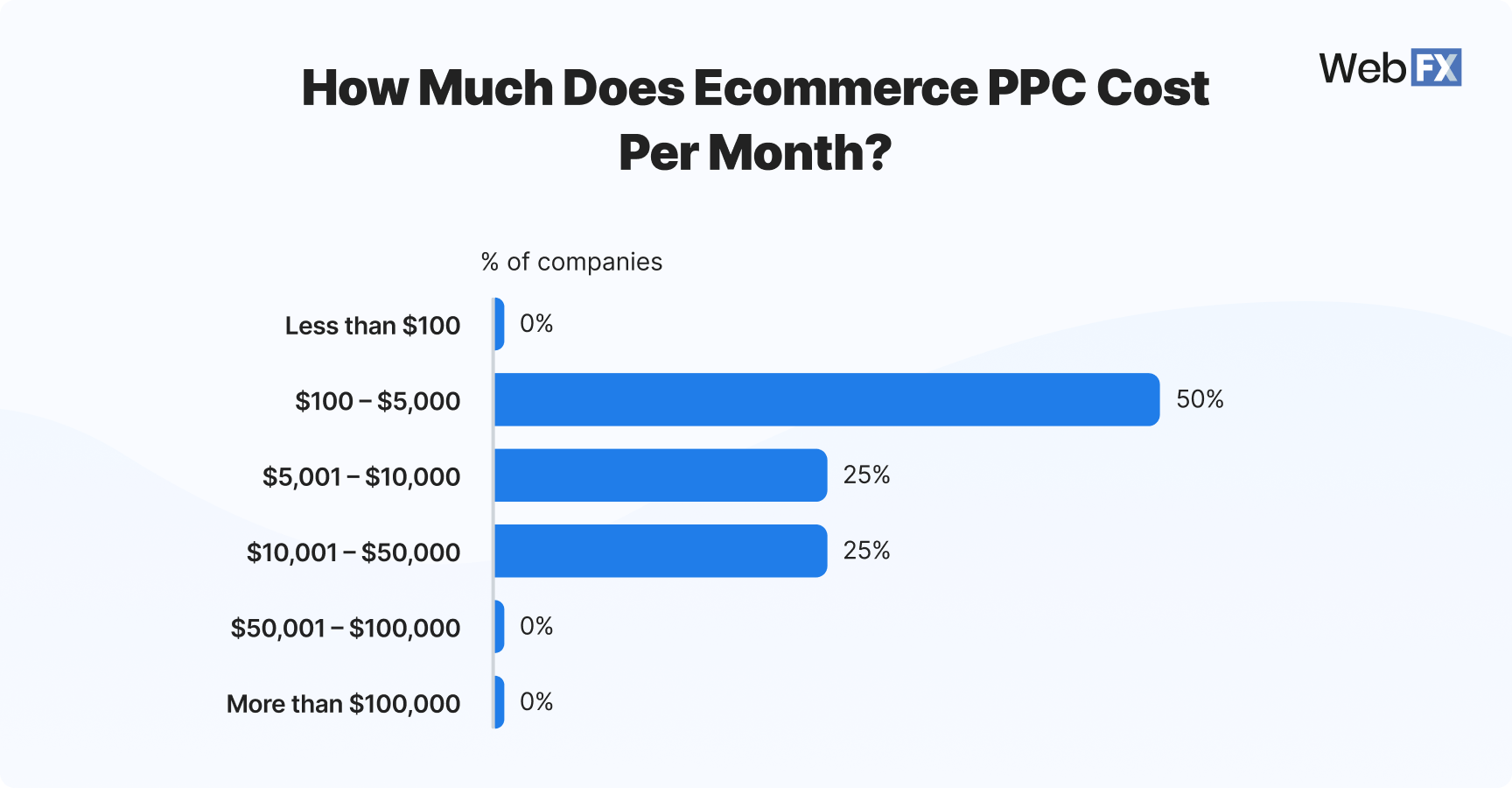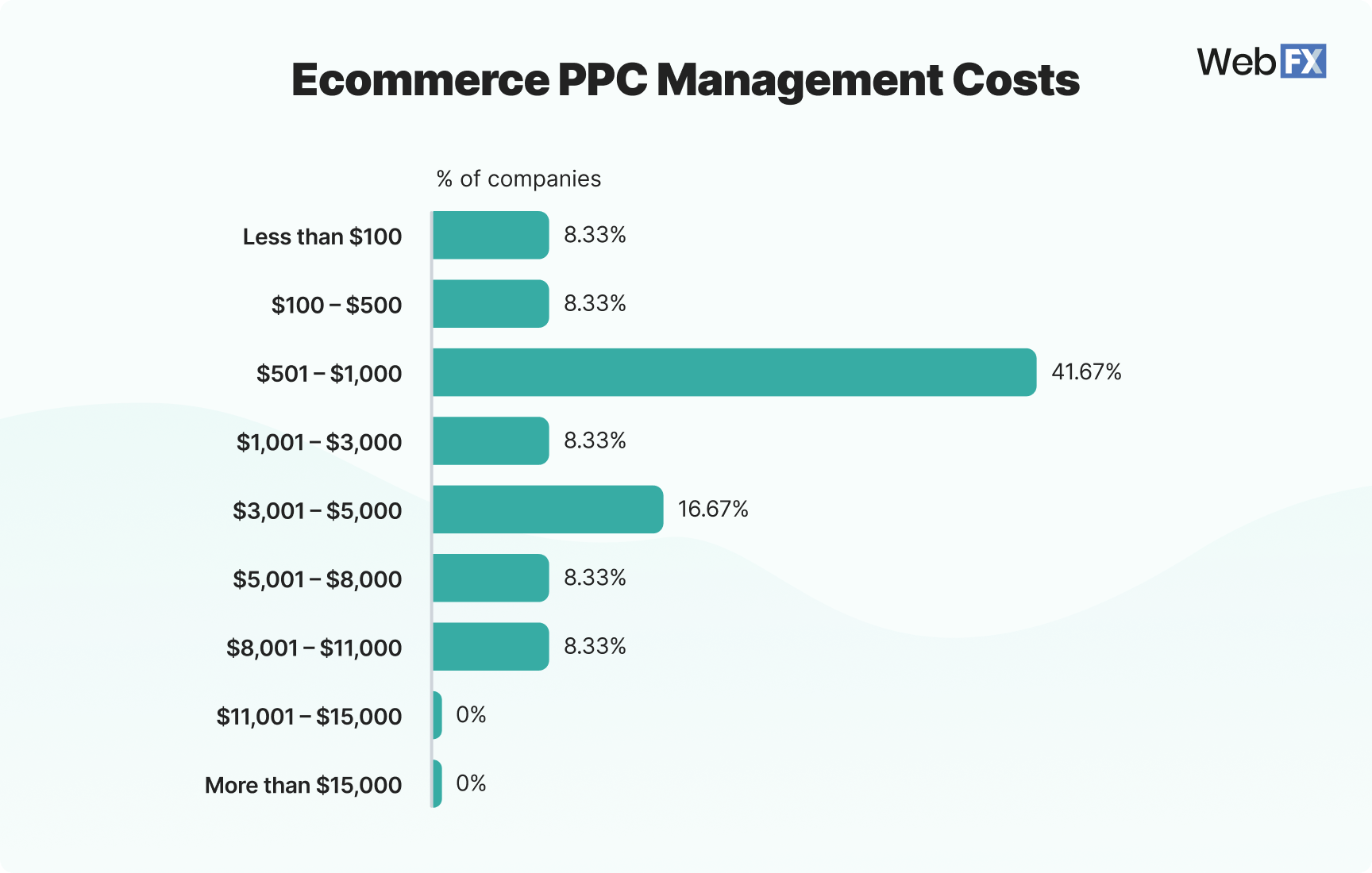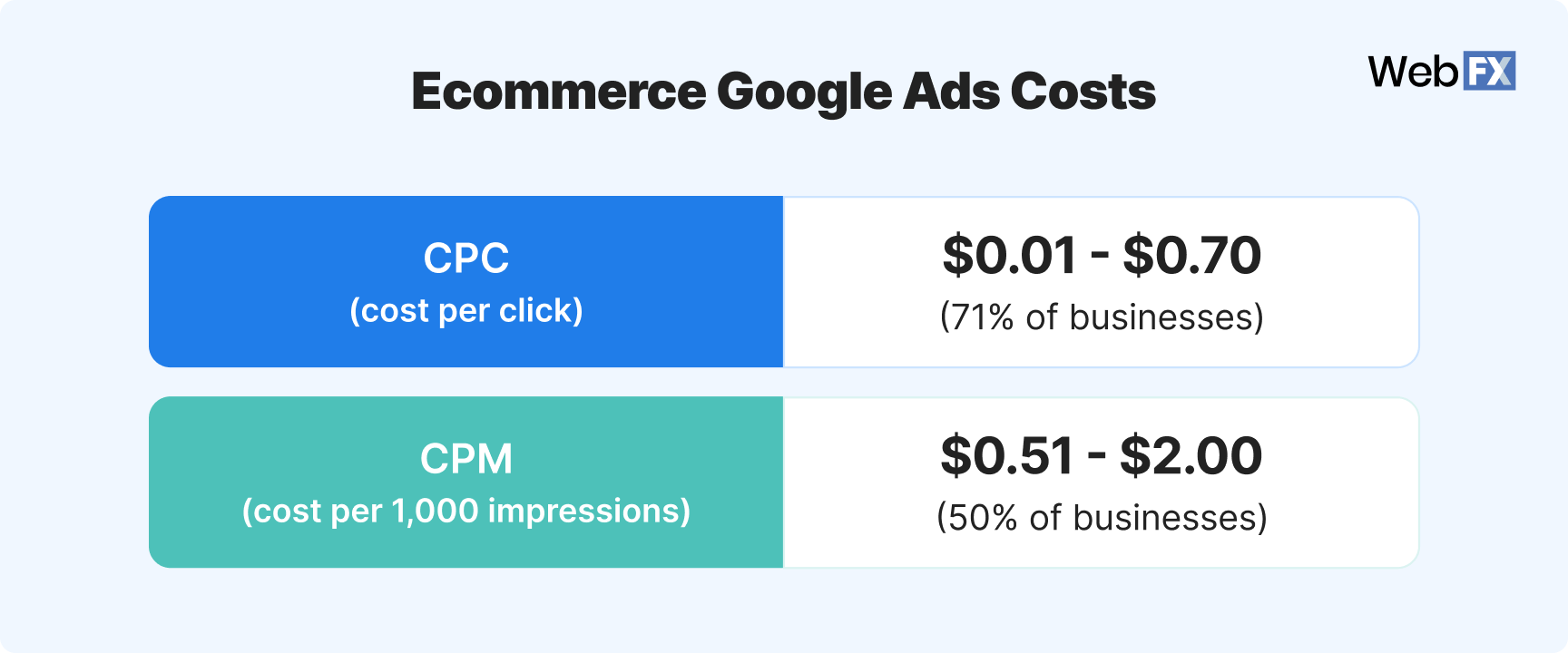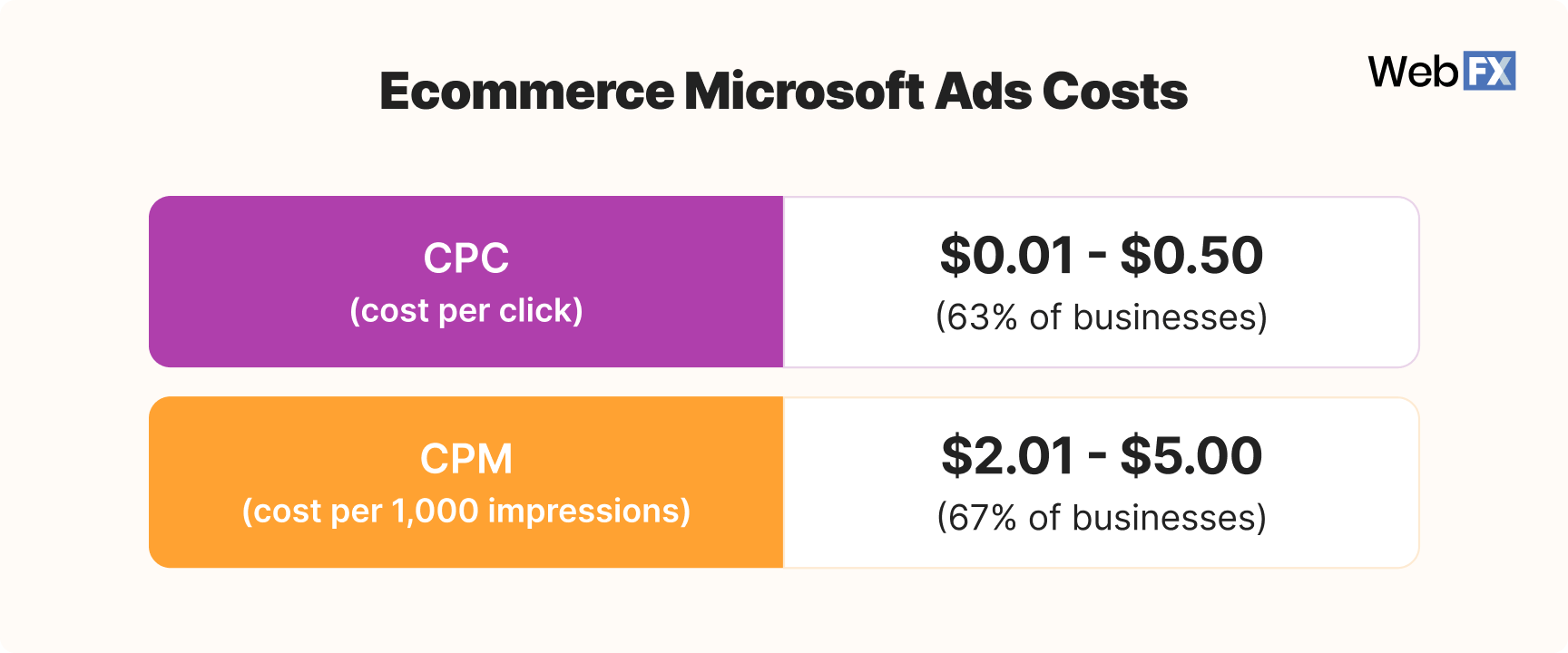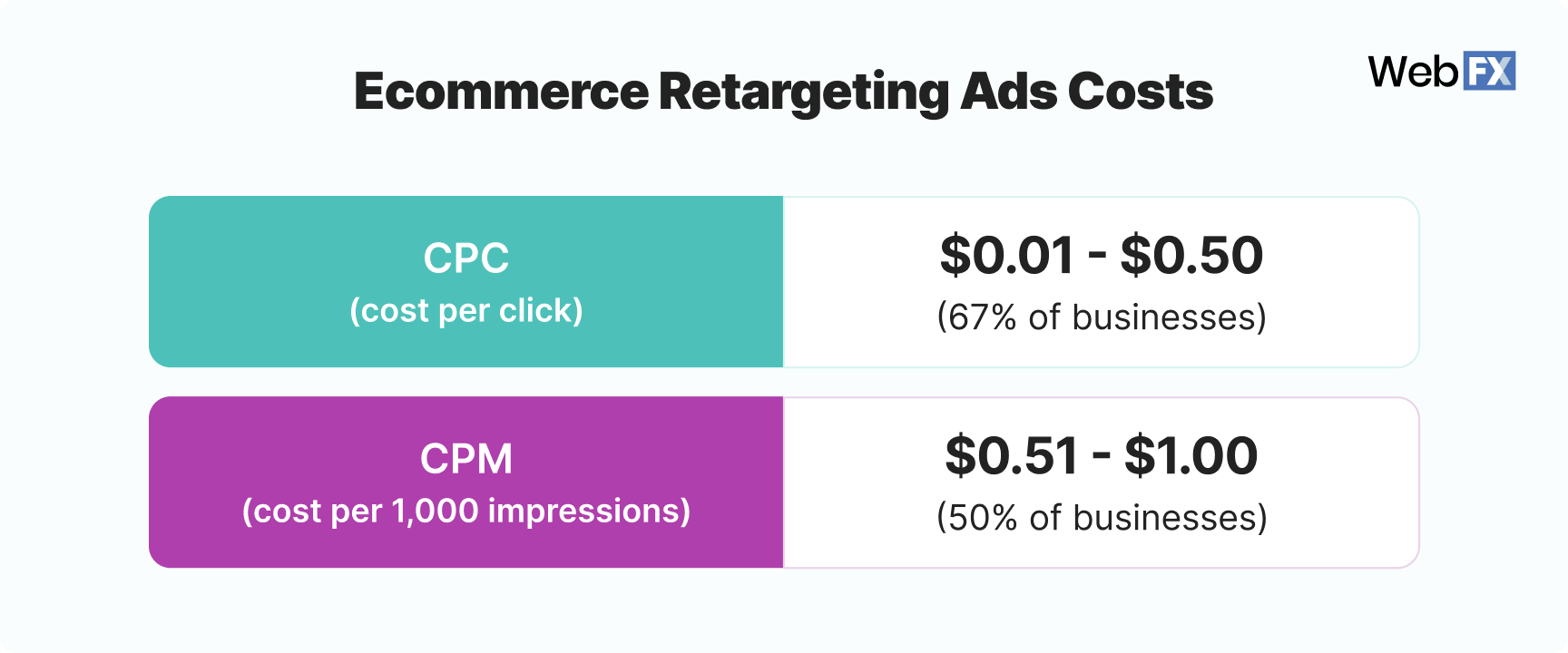Ecommerce PPC Pricing: How Much It Costs in 2026
Last Updated: May 23, 2025
Ecommerce PPC pricing can vary widely, but according to our data, you can expect to pay anywhere from $100 – $50,000 per month on average. There are lots of factors that can influence how much you’ll spend on PPC ads, like the competitiveness of your keywords, your chosen agency or freelancer, and more! Keep reading to learn more about ecommerce PPC costs from the 250+ businesses we surveyed!Original Data:
WebFX helps companies like yours reach their business goals.
See Case Study“WebFX has always worked hard to make sure that we’re getting what we need out of the partnership, not just what may seem like the best result.”
An Inside Look at WebFX Ecommerce PPC Pricing
🔎 PPC audit Boost your visibility, generate sales, and drive revenue with WebFX’s custom PPC solutions tailored to your unique company’s needs, goals, and industry.
WebFX Expertise
Highlights
🖌️ Ad design
📝 Ad copywriting
🎨 Ad landing page builds and optimization
💰 Bid management
Join the 1,450+ trusting WebFX to drive revenue through paid search
Too many marketing providers take a copy-and-paste approach to pay-per-click ads. That’s not our style.
How much do ecommerce PPC services from WebFX cost?
If you’re curious about our ecommerce PPC services (and their costs), browse our pricing table:
| Features | Lite | Pro Most Popular | Enterprise |
|---|---|---|---|
| Investment | |||
| Ad Spend Limit | $100 – $5,000/month ad spend (paid to networks) | $5,000 – $30,000/month ad spend (paid to networks) | $30,001+/monthly ad spend (paid to networks) |
| Initial Optimization | $1,200 (First Month’s Management including Campaign Restructure) | $2,250 (First Month’s Management, including Campaign Restructure, Creative Development) | $5,800 (First Month’s Management, including Campaign Restructure, Creative Development) |
| Progressive monthly management cost: | $600 | $975 or 15% of spend, whichever is higher | 12% of ad spend +$250/mo. platform fee |
| Included Networks | |||
| Google PPC Network | |||
| Google Local Services Ads | |||
| Bing PPC Networks | |||
| Google Text Ad Remarketing & Banner Remarketing (if banner ads are included, provided by the client, or creative banner design is paid for) | |||
| Google customer match & audience match | |||
| Google Shopping Management | |||
| AdTechFX Programmatic Advertising powered by RevenueCloudFX | |||
| – 3rd Party Audience Targeting | |||
| – Account-Based Retargeting | |||
| – CRM Pipeline Retargeting | |||
| Management Deliverables | |||
| 750+ SMEs behind campaign driving results | |||
| Initial campaign development & strategy | |||
| Advanced keyword research and selection | 2,000 Keywords | 10,000 Keywords | 10,000 Keywords |
| Industry analysis | |||
| Ad campaign copywriting | |||
| Ad copy performance testing | |||
| Ongoing keyword development and tweaking | |||
| Dynamic keyword insertion into ads | |||
| Google analytics integration & goal tracking | |||
| Strategic bid management | |||
| PPC account settings monitoring (Ex. Geotargeting) | |||
| Campaigns will be managed through client’s SEM accounts for (client will retain Admin/owner access of all campaigns created) | |||
| Up to two personal consultations per month | |||
| Monitoring clicks, conversions and click fraud activity | Yes | ||
| Setup and management of rule based bidding | |||
| International PPC campaign management (Addtl. fees may apply) | |||
| Creative Deliverables | |||
| Setup of 1 FunnelsFX Landing Page template | |||
| Display Ad Creatives (One Time) | One Time: 2 sets rapid display ads – 16 ads total (8 images per set) | One Time: Up to 3 Sets of Custom Layout Display Ads – 24 Ads Total (8 images per set) | |
| Connected TV Commercial Ads (One Time) | N/A | One Time: 1 15-second rapid ConnectedTV ad | One Time: 1 Set of Rapid CTV Ads 15 + 30 Seconds (2 videos total) |
| Audio Commercial | Coming Soon | Coming Soon | |
| International Campaigns (SEM Only) – Each additional language monthly management cost: | $275 | $275 | |
| Performance Reporting | |||
| Monthly performance & analysis reporting | |||
| Website conversion analysis reporting | |||
| Omni-channel customer journey tracking and reporting | |||
| Federated Ad CLID Pool for tracking calls to specific paid ad campaign | Shared pool (Up to 25 concurrent Paid Advertising visitors) | Shared pool (Up to 50 concurrent Paid Advertising visitors) | |
| IntegrationsFX: Conversion Based Smart Bidding | Included with  License License | Included with  License License | |
| IntegrationsFX: Lookalike + Custom Audiences | Included with  License License | Included with  License License | |
| Add Ons | |||
| Dedicated Federated Ad CLID Pool of 25 dedicated numbers and 25 concurrent visitors | $100/month | $100/month | $100/month |
| Dedicated Federated Ad CLID Pool of 100 dedicated numbers and 100 concurrent visitors | $400/month | $400/month | $400/month |
| Premium Display Ad Creative | $900 per set | $900 per set | $900 per set |
| 15 Sec Premium CTV Commercial Creative | $600 per video file | $600 per video file | $600 per video file |
| 30 Sec Premium CTV Commercial Creative | $900 per video file | $900 per video file | $900 per video file |
| Additional Sets of Lite Display Ad Creative | $300 per set | $300 per set | $300 per set |
| Additional Sets of Lite CTV Commercials | $300 per video file | $300 per video file | $300 per video file |
| Weekly Data Calls: Review campaign changes every 7 days | $600/month | $600/month | $600/month |
| Translation Services: | By Quote | By Quote | By Quote |
| Website conversion analysis implementation | By Quote | By Quote | By Quote |
| Social Media Advertising | By Quote | By Quote | By Quote |
| Landing page performance testing | By Quote | By Quote | By Quote |
Need more information? Call Us: 888-601-5359 | GET STARTED | GET STARTED | GET STARTED |
For our ecommerce services, we follow a flat-rate and percentage of ad spend pricing model. Our Basic Plan, for example, includes a flat-rate price while our Aggressive Plan and Market Leader Plan use the percentage of ad spend pricing model.
PPC cost calculator
Get accurate PPC management pricing with our free PPC cost calculator!
PPC Pricing Calculator
Meet WebFX
A world-class digital marketing agency with thousands of reviews applauding our transparency.


Related Resources
-
 50 Unique Ways You Can Use AI Deep Research for Marketing 23 minute read
50 Unique Ways You Can Use AI Deep Research for Marketing 23 minute read -
7 Benefits of Working with a Google Partner Agency 11 minute read
-
 Google Ads Consulting: Why Hire a Google Ads Consultant? 6 minute read
Google Ads Consulting: Why Hire a Google Ads Consultant? 6 minute read -
Grow Your Sales with Google Shopping Management Services 8 minute read
-
 How to Choose the Best PPC Agency to Improve Your ROI 7 minute read
How to Choose the Best PPC Agency to Improve Your ROI 7 minute read

